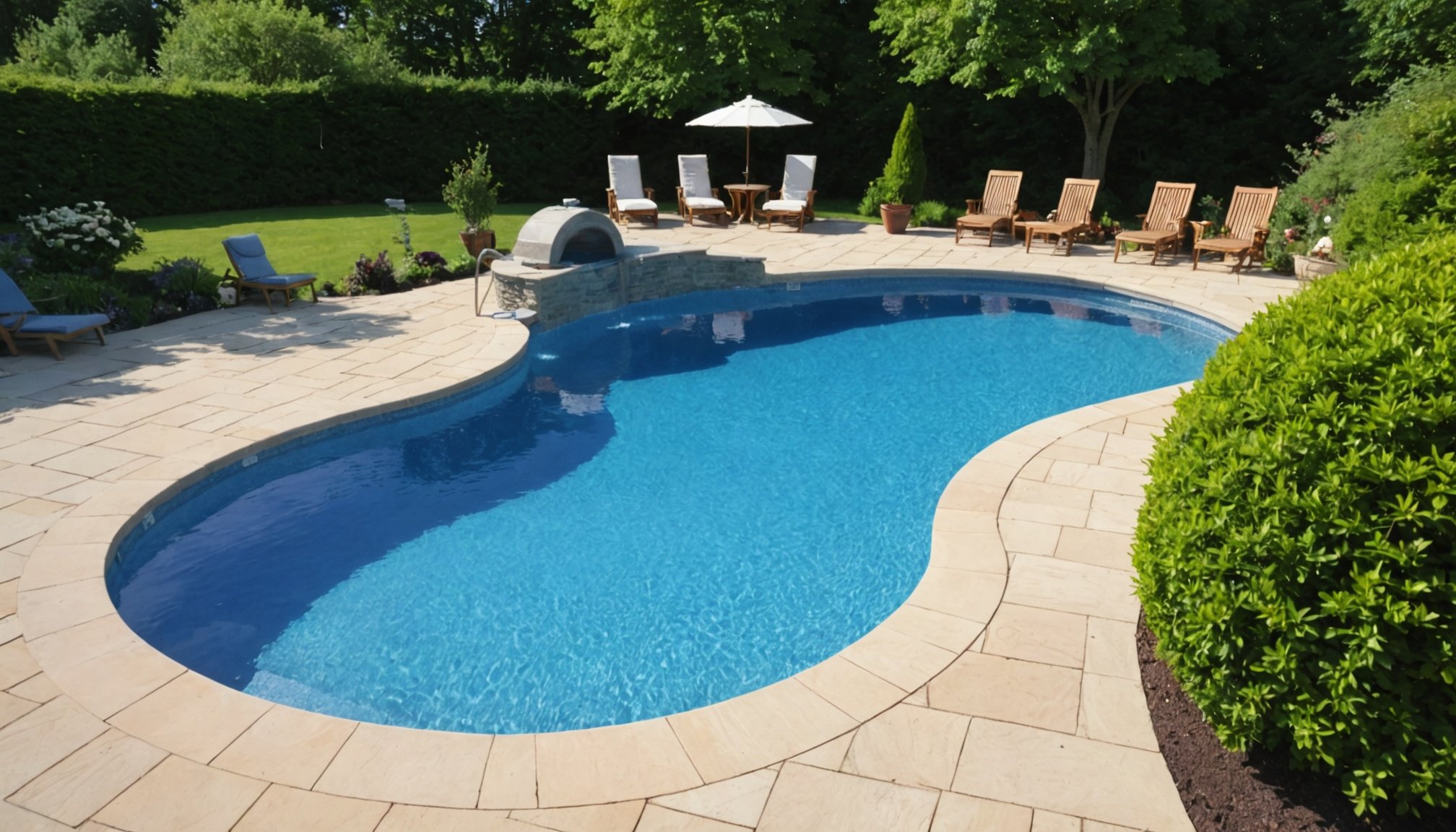Key Benefits of Saltwater Pools for UK Homeowners
Saltwater pool benefits UK homeowners by offering a gentler, more comfortable swimming experience compared to traditional chlorine pools. Unlike chlorine pools that rely on direct chemical addition, saltwater systems generate chlorine through salt electrolysis, ensuring a consistent, lower chlorine level. This process significantly reduces skin and eye irritation, a common complaint among swimmers using chlorine pools.
The main differences between saltwater vs chlorine pools rest in maintenance and water quality. Saltwater pools typically require less frequent chemical balancing, making pool upkeep simpler. Moreover, the water feels softer and less harsh, increasing enjoyment during swims, particularly in the UK’s temperate climate.
In parallel : How Can a Home Swimming Pool Enhance Your Property’s Appeal?
Considering the UK-specific climate, saltwater pools prove especially suitable. The mild weather and shorter swimming seasons benefit from saltwater systems’ ability to maintain stable sanitizer levels despite fluctuating temperatures. This stability helps prevent algae growth and improves water clarity without excessive chemical use, enhancing the overall swimming experience year-round.
In summary, the advantages of saltwater pools include reduced irritation, easier maintenance, and improved water quality, making them an appealing option for UK homeowners seeking a better pool experience.
This might interest you : How can you transform your UK backyard with a stylish swimming pool design?
Improved Water Quality and Comfort
Gentle on skin and eyes, water quality directly affects swimmer comfort. By optimizing chemical levels, notably chlorine, swimming pools offer a more pleasant experience with reduced skin and eye irritation. This is crucial for frequent swimmers or those with sensitive skin, as harsh chemicals can lead to dryness or redness.
Lower chemical concentrations also contribute to softer-feeling water, enhancing overall enjoyment. Swimmers often describe this sensation as less abrasive, making prolonged swimming sessions more comfortable.
Moreover, careful water quality management positively impacts people with allergies or sensitivities. Minimizing irritants can reduce unwanted reactions, allowing more individuals to swim without discomfort. This combination of factors ensures that pools cater not only to health standards but also to swimmer well-being.
Maintaining this balance requires regular testing and treatment adjustments, but the benefits to swimmer comfort and safety are significant. Ensuring water is gentle on skin and eyes while maintaining quality creates a welcoming environment for everyone.
Health and Safety Considerations
Saltwater pool safety offers significant health benefits compared to traditional chlorinated pools. One of the main advantages is the lower risk of exposure to harsh chemicals like chlorine in high concentrations, which can irritate skin, eyes, and respiratory systems. Continuous, low-level sanitisation in saltwater pools maintains clean water without the strong chemical smell or discomfort often associated with conventional pools. This creates a gentler and more natural swimming experience, reducing the chances of allergies and skin reactions.
From a family swimming environment perspective, saltwater pools are generally safer for children and pets. The milder water means less risk of chemical burns or allergic responses, making it easier for vulnerable family members to enjoy swimming without worry. Additionally, the continuous sanitisation process minimizes harmful bacteria and pathogens, supporting a healthier recreational space.
In short, saltwater pool safety enhances wellbeing by combining effective sanitation with gentler water conditions. Families seeking a safer and more comfortable swimming environment will find these benefits particularly compelling, making saltwater pools a smart choice for both health and enjoyment.
Maintenance and Upkeep in the UK Climate
In the UK, pool maintenance requires special attention due to the variable weather. Saltwater pools offer a simplified routine, but saltwater pool upkeep still demands regular checks. Salt systems reduce the need for manual chlorine addition, but pH balancing and salt levels need monitoring to prevent corrosion and ensure water clarity.
UK weather, with its fluctuations in temperature and frequent rain, impacts UK weather pool care significantly. Cold spells slow down salt cell efficiency, while rainfall can dilute salt concentration, requiring adjustments. Algae growth may accelerate during warmer, humid periods, necessitating more rigorous cleaning.
Common challenges include balancing chemical levels amidst changing weather and managing debris from trees during autumn. Effective solutions involve consistent water testing, use of pool covers to reduce contamination, and scheduling maintenance around seasonal changes. For those seeking efficient management, understanding the specific impacts of UK weather on saltwater pools is vital to prolong system longevity and maintain optimum swimming conditions.
Cost Analysis: Upfront and Long-Term Savings
Understanding saltwater pool costs UK begins with the initial investment. Installation typically involves higher upfront expenses compared to traditional chlorine pools because of specialized salt chlorination systems. However, these costs often balance out over time through significant cost savings on chemicals and maintenance.
Saltwater pools reduce reliance on harsh chemicals, which lowers the ongoing purchase of chlorine and stabilizers. This translates to financial relief, especially as prices for pool chemicals rise in the UK market. Moreover, maintenance tasks such as frequent water balancing and filter cleanings become less intensive, reducing service calls and labor costs.
The pool investment in a saltwater system also adds value when considering long-term usage. Many UK homeowners report fewer repairs and longer equipment lifespan, which improves the return on investment. This is supported by current UK market trends in saltwater pool ownership, which show steady growth as buyers seek cost-efficient and environmentally friendly alternatives.
Choosing a saltwater pool means weighing higher installation fees against durable savings. For those committed to pool ownership, the financial benefits revealed by market data reinforce the appeal of saltwater systems in the UK.
Environmental Impact of Saltwater Pools
Exploring sustainability and eco-friendly benefits
Saltwater pools offer notable environmental benefits due to their reduced reliance on harsh chemicals compared to traditional chlorine pools. By generating chlorine through salt electrolysis, they minimize the introduction of synthetic chemicals into local water systems. This reduction in chemical use decreases potential harmful runoff, which is a significant advantage for eco-conscious homeowners interested in sustainability in the UK.
From an energy perspective, saltwater pools often incorporate energy-efficient filtration and circulation systems. These systems can consume less electricity when properly maintained, contributing to a smaller carbon footprint. However, the initial setup of saltwater generators can require thoughtful energy management to maximize these gains.
Conserving water is another important environmental factor. Saltwater pool owners often experience fewer water replacements, as the balanced saline environment reduces evaporation rates and limits the need for frequent top-ups. Additionally, waste management practices improve with saltwater pools since fewer chemical containers are disposed of, promoting a cleaner, safer environment. Together, these elements make saltwater pools a strong contender for those prioritizing eco-friendly pools and long-term sustainability goals.
Installation Guidance and UK Regulations
When considering saltwater pool installation UK, it is crucial to understand both practical steps and legal requirements. Begin with thorough planning, including site assessment and deciding on pool size and location. Following this, obtain any necessary UK pool regulations compliance, such as local council approvals and planning permission, which vary depending on pool type and position on your property.
Installation tips emphasize choosing reputable contractors familiar with saltwater pool installation UK standards to ensure long-term durability and safety. Select corrosion-resistant materials suited for saline environments, as saltwater can accelerate wear. Using high-quality filtration and chlorination systems tailored to saltwater pools ensures efficiency and reduces maintenance overhead.
Navigating UK pool regulations also requires addressing safety aspects. Secure fencing and compliant covers are often mandatory to prevent accidents, especially in homes with children. Consulting local authorities early in the project can help avoid delays and ensure your saltwater pool installation aligns with all legal requirements, safeguarding your investment and enhancing enjoyment for years to come.
Challenges and Practical Considerations Unique to the UK
The UK climate effects significantly impact saltwater pool maintenance and use. Colder temperatures and frequent rain limit swimming seasons, requiring pool owners to adapt their schedules and maintenance routines accordingly. Seasonal changes can cause water chemistry imbalances more quickly, demanding regular monitoring to prevent corrosion or algae growth.
Saltwater pool challenges UK often stem from the corrosive nature of salt on pool equipment and nearby landscaping. Metal fixtures, pumps, and filters must be made from corrosion-resistant materials such as stainless steel or plastic to withstand salt exposure. Additionally, salt spray and runoff can affect garden plants, so careful placement and protective landscaping measures are essential to avoid damage.
To overcome these hurdles, effective pool ownership tips UK include investing in high-quality covers to retain heat and reduce debris during colder months. Regular equipment checks and timely winterising help extend lifespan and maintain performance. Understanding how saltwater interacts with both the pool and surrounding environment enables owners to enjoy their pools year-round, despite the UK’s less predictable weather.









